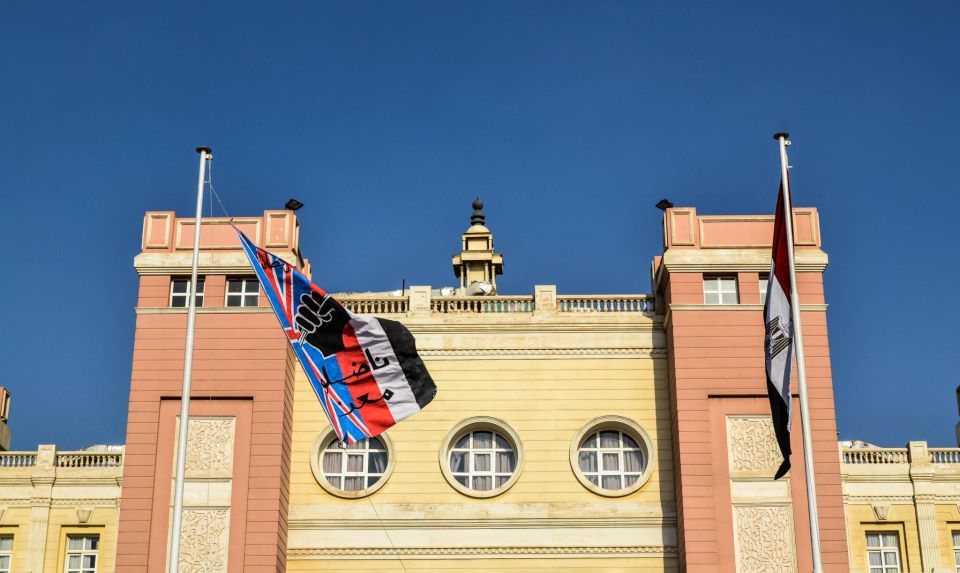By Rania Al-Malky and Sarah El Sirgany
CAIRO: In a highly anticipated speech that left many disappointed, President Hosni Mubarak said that he will delegate presidential authority to Egypt’s Vice President Omar Suleiman but within the constraints of the constitution, which does not give him the authority to dissolve parliament and cabinet.
The speech, in which many expected the President to step down, included a passing apology over the deaths reported during protests last week.
Mubarak referred to the constitutional amendments that are currently being drafted by a constitutional reform panel: article 76, regulating presidential elections and the conditions for candidature; article 77, regarding term limits for the president; article 88 concerned with how elections are conducted; article 93 concerned with court rulings on rigged votes; and article 189 regarding the process of amendments to the constitution. He also requested the cancellation of article 179 which allows the president to use military courts.
Immediate reactions to President Mubarak’s speech were negative. Youth activist Asmaa Mahfouz, speaking to BBC Arabic, said that the speech is completely rejected.
Al-Wafd Party’s chairman Al-Sayed Al-Badawy also told the BBC that the promise to hand over authority to the VP came too late.
Minutes after Mubarak’s speech, VP Suleiman President reiterated that the president put the interests of the nation above all else, emphasizing his commitment to peaceful transition of power according to the constitution.
He said that he will continue the national dialogue he had already started and will help realize the people’s demands, but called on all citizens to look to the future which he described as “bright with freedom and democracy.”
He also warned against the “destructive agendas” intent on “obstructing our goals” and urged protesters to go home.
Protests have been sweeping the country since Jan. 25, when online activists called for street action to shed light on police brutality on Police Day. But when thousands took to the streets, instead of calling for political and economic reforms, they called for toppling the regime.
The protests gained momentum despite a violent crackdown that reached its height on Jan. 28-29 and on Feb. 2. Numbers grew to reach hundreds of thousands, with estimates that more than 2 million were protesting on Feb. 8 across Egypt.
Labor protests and strikes began sprouting on Feb. 9-10, including in key industries such as public transport. Protesters called for yet another “million man march” on Friday to commemorate over 300 killed in protests. Feb. 11 was expected to draw the largest number of protesters across Egypt.
At around 5 pm on Thursday, an army officer reportedly told protester to expect an important statement from the military responding to their demands. This coincided with other official statements that suggested the President might step down, a notion labeled earlier as unthinkable.
Speculation about the president’s resignation fueled cheers in protests around the country, especially in Tahrir Square in Cairo. Crowds started flocking to the Square despite some concerns about a possible military coup that might impose martial laws.
The newly appointed Secretary-General of the ruling National Democratic Party, told BBC that Mubarak should step aside.
“I expect the president to respond to the demands of the people, because what matters to him in the end is the stability of the country. The post is not important to him,” Hossam Badrawy said.
“The right action in my opinion is to send a letter for constitutional amendments, to step aside and give the power to the vice president and to ask for early elections when the amendment is approved,” he said.
“I don’t think he will leave the country. He is a military hero, he has lots of good things that have been done, lots of mistakes too,” he added.
Later, the Supreme Council of the Armed Forces issued what it called “statement number one”, saying that the council will remain in continuous session to consider measures necessary to protect the nation.
In addition to affirming its commitment to protecting citizens’ safety, the council also cited its “support for the legitimate demands of the people”. TV footage of the meeting showed the absence of Mubarak, the military commander-in-chief.
The head of the US Central Intelligence Agency also said it was likely Mubarak would step down in the following few hours.
“There’s a strong likelihood that Mubarak may step down this evening, which would be significant in terms of where the, hopefully, orderly transition in Egypt takes place,” Leon Panetta told a congressional hearing in Washington.
Prime Minister Ahmed Shafiq also told the BBC that the 82-year-old strongman may step down.
Mubarak met with Shafiq and Vice President Omar Suleiman in the evening, according to State TV.
Minister of Information Anas El-Fiqi, however, told news agencies that the president wouldn’t step down.
At 8 pm, US President Barack Obama said “We are witnessing history unfold — it is a moment of transformation that is taking place.”
“We want those young people – and all Egyptians – to know America will continue to do everything that we can to support an orderly and genuine transition to democracy in Egypt,” he added. –With agencies

